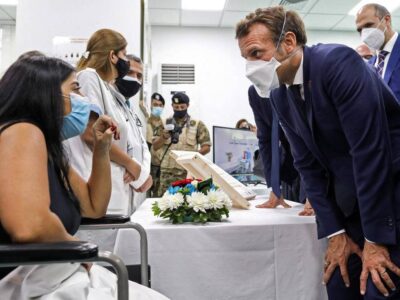
Hezbollah terrorist group is actively undermining France’s help for Lebanon
On Sunday, Lebanon’s Maronite Christian patriarch, Bechara Boutros Al Rahi, made several statements that were far reaching. He essentially underlined that the Lebanese state could not co-exist with the behaviour of Hezbollah.
The patriarch’s remarks came as Lebanon is struggling to form a government in line with the initiative presented by French President Emmanuel Macron in early September. It calls for a “mission focused” government of specialists to address Lebanon’s grave financial and economic crises. These specialists would enjoy the support of the political parties, but would not include politicians.
The process has been derailed by the country’s two leading Shiite parties, Hezbollah and Amal, who have insisted that the finance minister be a Shiite, and that this condition always be respected in future governments. Their demand went against the principle of a rotation of ministerial portfolios over which virtually all other Lebanese parties agree, including a number of Hezbollah’s allies.
By demanding that the finance minister always be a Shiite, Hezbollah and Amal appeared to be surreptitiously altering Lebanon’s constitutional custom without a formal constitutional amendment. The reason is that the finance minister must countersign legislation involving expenditures, and the Shiite parties have regarded this as granting them an unofficial right of veto over laws with which they disagree, alongside the Maronite president and the Sunni prime minister.
In his speech, Mr Al Rahi questioned the parties’ insistence on this. He rejected the idea that Lebanon’s sects could reserve portfolios for themselves and then made a more profound point. He declared that if the Shiites, particularly Hezbollah, wanted to change the Lebanese system, then they had to make major concessions of their own. He implied they had to end the existence of their state within a state, surrender their weapons, and accept Lebanon’s neutrality.
For the first time a leading Lebanese figure has underlined that Hezbollah’s actions are undermining the interests of the state – in this case the successful conclusion of the Macron initiative that is vital to bringing Lebanon urgently needed international financial aid. The patriarch’s statements clearly shocked the Shiite parties, and hours later the Higher Shia Council, over which Hezbollah and Amal have influence, released a statement condemning them.
For an understanding of what is going on, one has to see what is happening in the region. The recent peace agreements concluded with Israel by the UAE and Bahrain have altered the strategic landscape. Where Iran has sought to place its missiles in Lebanon and Syria to strike Israel, the peace deals turned the tables, with Israel building strategic alliances in the Gulf region.
This appears to have led to a hardening of Iran’s attitude in Lebanon. Many observers believe that Hezbollah’s demand that the finance minister be a Shiite was aimed at undermining the French initiative. Tehran reportedly felt that an apolitical government in Beirut might hinder Hezbollah’s ability to act from Lebanon, when Iran might need the party to retaliate against an Israeli attack on its territory.
In effect Iran, if it prevented implementation of a French plan designed to bring economic relief, condemned millions of Lebanese to great economic pain, perhaps even famine, including Hezbollah’s supporters. Worse, Hezbollah and Amal are isolated today, with even their ally, President Michel Aoun, opposed to the parties’ refusal to accept a rotation in the finance ministry.
On September 22, former prime minister Saad Hariri may have created an opening for a resolution of the impasse in Lebanon. He agreed to an independent Shiite as finance minister while refusing to accept that the finance portfolio was reserved for the Shiite community. If this is accepted by Hezbollah and its allies, it may revive the French initiative.
While the party had not responded formally to Mr Hariri yet, were it to refuse his proposal it would show that Hezbollah has no solutions for Lebanon’s serious economic crisis, offers no vision for the country other than to remain a satrapy of Iran, and is trying to preserve a political status quo that most Lebanese reject.
And it has just been called out on much of this by the Maronite patriarch. Hezbollah’s response through the Higher Shia Council showed that it could only muster support for its position from within its community’s sectarian institutions. This is a far cry from a party that had once portrayed itself as the vanguard of regional resistance against Israel and America. By transforming itself into an Iranian tool, it has allowed Tehran’s priorities to steadily erode its domestic standing.
What will this mean for the future? If Hezbollah’s ultimate role is to strengthen Iran’s deterrence capability against Israel and the U.S., then the contestation it is facing in Lebanon may have neutralised that capability. No Lebanese wants to see his or her country destroyed on Iran’s behalf. Nor do they want to see Lebanon disintegrate economically because of a veto from Tehran. For most Lebanese the message is clear: Hezbollah’s preferences usually offer only more misery.
Source: The National





